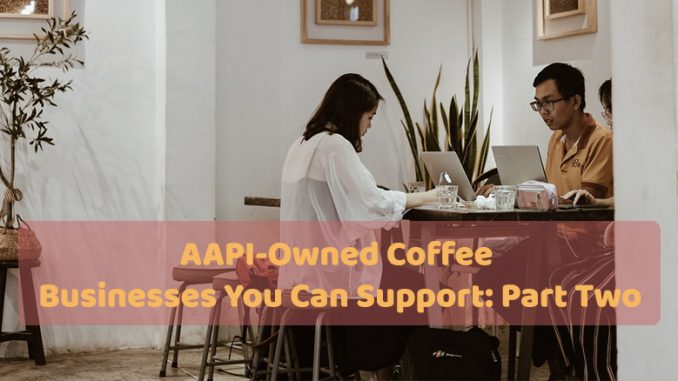
Today, we’re talking to Waterbean Coffee and Portland Cà Phê—two cafés with roots in Vietnam.
BY EMILY MENESES
SPECIAL TO BARISTA MAGAZINE ONLINE
Cover photo by Duy Hoang for Unsplash
One of the most special things about coffee is the global nature of it. This one beverage tells infinite stories of different regions around the world; it’s integral to countless cultures and countries, and it means something different to every individual who crafts and consumes it. In response to the recent increase in nationwide anti-Asian violence, we started a series spotlighting Asian-owned cafés across the United States; read part one here. Today, we’re concluding the series by highlighting Portland Cà Phê and North Carolina’s Waterbean Coffee, two shops inspired by their owners’ Vietnamese roots.
Waterbean Coffee – Multiple locations, North Carolina
When Tony Vo (he/him) first decided to start a café, his motive was simple: to create a space where locals could grab a good cup of coffee and feel at home. His wife thought of the name Waterbean—a reference to the two key ingredients that go into creating a cup of coffee—and the rest was history.
“(My wife and I) are both originally from Vietnam, which is the second-largest coffee producer in the world,” Tony shared. “So we know how important it is for a coffee shop to have a good vibe. Sometimes the environment can be just as important as the product itself. We started our first location late in 2013 in Cornelius, N.C., and within seven years, we’ve become the fastest-growing local café with eight locations. We also opened our first international location in Vietnam.”
Tony also shed light on his migration from Vietnam to the U.S., which happened when he was just 8 years old. “I came to the U.S. with my grandparents. My grandfather was a prisoner of war during the Vietnam War, so he and his children got to come to the U.S. under the Humanitarian Operation program. My parents didn’t go because they were already married, and only unmarried children could come.”
“I was fortunate because my grandparents took over my guardianship and raised me,” he continued. “It wasn’t easy coming from nothing and not knowing how to speak the language, but my parents allowed me to go with my grandparents because they believed in America and what the land of opportunities could provide.”
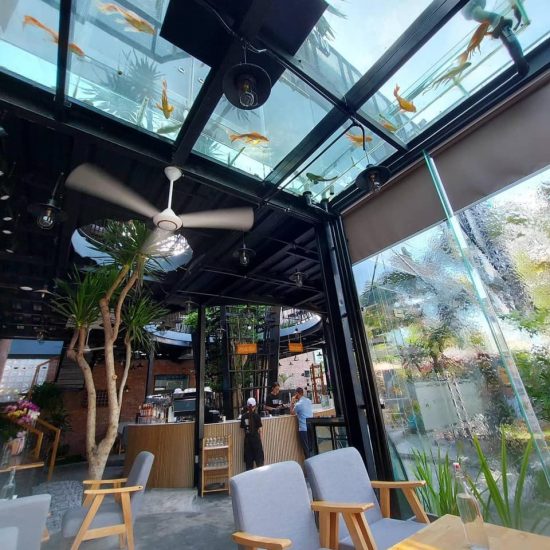
Today, Tony expresses great pride in Waterbean’s two-story Vietnam location, which features a ceiling aquarium that people on the first floor can gaze at overhead. The café, which also features a pond, waterfalls, and a retractable glass rooftop, is surrounded by and inspired by nature.
“I just want everyone to know that we (Asian Americans) immigrated here for a better future for ourselves and for our children,” Tony stated. “We don’t expect a handout—we just want the opportunity to succeed. We are your friends, teachers, students, scientists, doctors, and job creators, but most importantly, we are all human beings.”
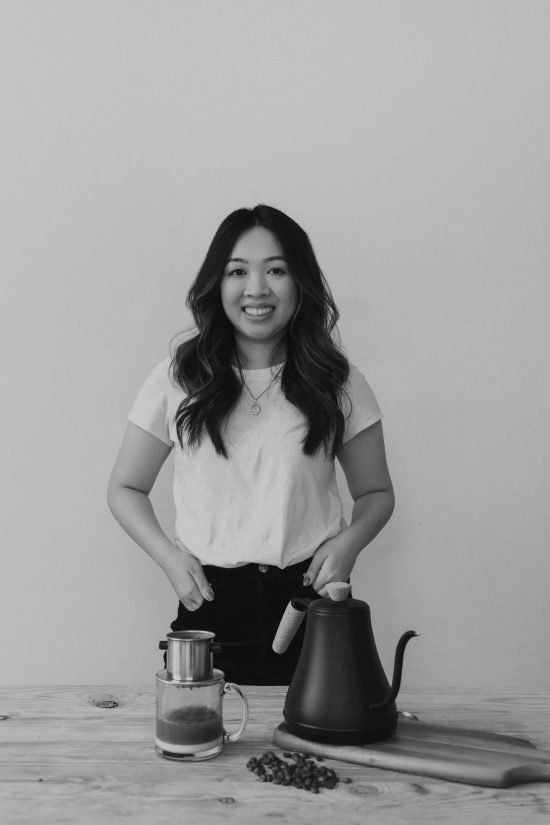
Portland Cà Phê – Portland, Ore.
Like many others quarantined in 2020, Kim Dam (she/her) found the inspiration to venture into a new project: Portland Cà Phê, a reflection of both her love for coffee and her Vietnamese roots. Prior to launching the shop, Kim had been a barista for over five years until moving into a career in social services—but during her time away from the coffee scene, her passion for the craft never stopped.
The burgeoning business has plans to open a storefront this spring. At the moment, with online operations, it specializes in single-origin coffee from the central highlands of Vietnam, which Kim roasts in Portland. “My family owns and operates a local Vietnamese sandwich shop called The House of Bánh Mì in Portland. I realized that we were using Café Du Monde for our cà phê sua dá (iced coffee with milk), and everyone had the impression that Vietnamese coffee was Café Du Monde or some sort of intense, dark-brewed coffee over sweetened condensed milk,” Kim shared. “Although it’s a delicious staple in our Vietnamese coffee culture, I knew Vietnamese coffee was more than that. I also noticed that many people were not actually using Vietnamese coffee beans to make these Vietnamese inspired coffee drinks—so I realized I had the opportunity to showcase Vietnamese coffee and the many ways it can be enjoyed.”
Kim also shared how important it was for her to bring Vietnamese coffee to Portland in particular: “The coffee roasting industry in Portland, Ore., is pretty male and white-dominated—I can think of maybe a handful of BIPOC-identifying roasters and one other BIPOC-identifying woman roaster here in PDX. … As I grow Portland Cà Phê, I would like to make myself easily accessible to other BIPOC women who would like to learn more about roasting, sourcing, and general information about the coffee industry in Portland.”
When asked how people can support the Asian American community at this time, Kim expressed gratitude to everyone who has joined the movement to raise awareness, amplify Asian American stories and voices, and learn about Asian history.
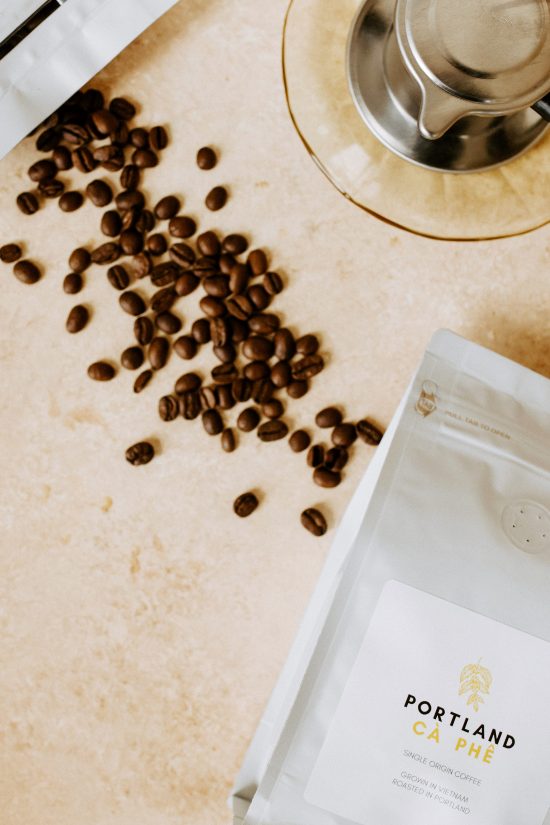
“One thing I would suggest is to make efforts in dismantling the idea of Asians as the model minority. It compares communities of color without accounting for the struggles that diverse Asian subgroups and other communities of color go through,” Kim stated. “This idea also works to minimize the socioeconomic issues and history of Asian Americans. It results in a competition of which community is more marginalized, and that is counterproductive … I would just ask if you choose to stand with us, make sure you stand for all communities. We all have a common goal of fighting against systemic injustices, and I truly believe we’re stronger together.”
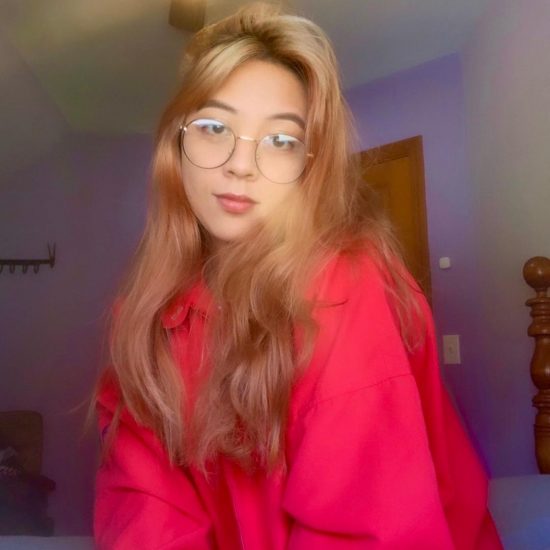
ABOUT THE AUTHOR
Based in Los Angeles, Emily Joy Meneses (she/her) is a writer and musician passionate about culture and collective care. You can regularly find her at Echo Park Lake, drinking a cortado and journaling about astrology, art, Animal Crossing, and her dreams. Explore her poetry, short stories, and soundscapes on her website.

